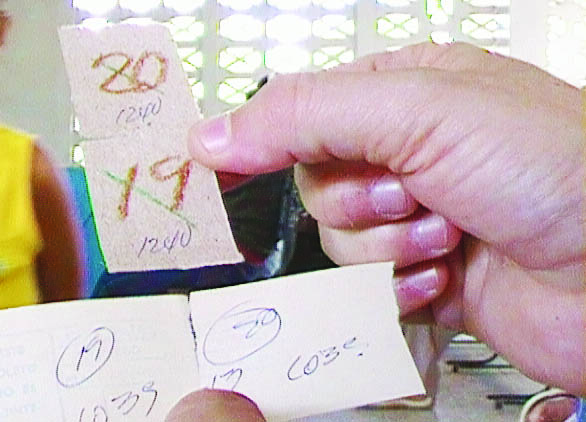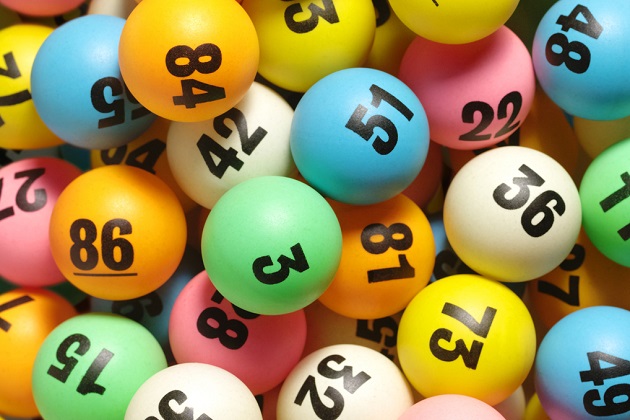Although it was banned more than half a century ago, the government has not been able to end the game.
Few months ago, Alberto, a pensioner who receives 270 pesos of pension, bought his wife a washing machine and a fan. Those of us who know him know that, although he is on duty at night in a cafeteria, he does not even have enough money for such expenses. Sure enough, when he asked his son, he answered me: “That’s what he got a parle.”
Although the ball is prohibited, although it is no longer pursued as in past times, today the morning greeting is: “What number came out?” The same on the street as in the warehouse or the market, it would seem that the games of chance they would have left the world of secrecy.
The numbers by which the ball is governed are received by radio from La Florida at 7:00 p.m. Few people have access to the station, that is why the information is transmitted by word of mouth.
Shortly after taking power, Fidel Castro eliminated the national lottery and banned all gambling. However, despite the persecution and imprisonment of those who practiced it, the game was not over, and even today the passion of the Cubans for it is exaggerated.
Bingo was also banned, one of the most popular games of chance in Cuba. It was almost always played as a family, and it was called a lottery. It was very fun, especially for the little ones in the house.
The game, as healthy fun, was part of our culture, as the poor and the rich played. Within the folklore of the proclamations there was no shortage of the ticket seller, who was announcing the numbers with his personal grace.
Before 1959, the National Lottery was played in Cuba. The money collected was used mainly for charities. On Saturdays at noon, the children of that institution sang the numbers through the media. The jackpot was one hundred thousand pesos for each ticket. There were wallets and stained-glass windows of points anywhere. It was famous for the apple of Reina and Águila, all full of stained glass windows that, although small, always had the desired number. When the government banned the game, everything was demolished and turned into parking. Today it does not escape the government’s abandonment. There are some bus stops whose routes start at the place, and the queues are in full sun, rain and serene.
For those who did not like the national lottery, they also played, among others, the Chinese ball, which was daily, and as the list was from 1 to 31, people had more chances to win. It was played with the illusion of trying their luck, and some did it, like Santiago Wong, who bought a national lottery ticket every week, until one day he won the jackpot. And although he never said how much money he had earned, he expanded his stall and set up a natural fruit ice cream shop. He also bought some furniture for his house. But the poor man was deprived of his prosperous business when the revolutionary offensive took place.
Despite the prohibitions, families who played lottery kept doing it, now with caution and fear. A friend told me a very funny anecdote: It turns out that a certain night of blackout, when I was little, some relatives and friends, mostly old people, started playing bingo by candlelight to kill time. When they were more enthusiastic, one of the girls in the house, who was sitting in the doorway waiting for a suitor, saw a chaser stand and ran lightly to warn them. Those old men shot out, and with unheard-of agility windows, walls and fences jumped, and there were even those who hid under a piece of furniture. And the nicest thing is that none of them thought of picking up the board and the bingo cards, which were definitely the “proof of the crime”. After the fright, which almost killed them, almost died of laughter: the persecutor had come to bring nothing less than the boy in love with the girl, who was a policeman.
Well, criminalizing the game over the years did not bring about anything else but the loss of ethical values in society, as children got used to seeing parents playing cat and mouse with the police.
The truth is that the game does not seem destined to disappear, because as a boy told me, “people go to that because they know that the State can not expect anything, and at least they have an illusion, a hope for improvement”.
LA BOLITA Y EL JUEGO “ILICITO” EN CUBA. A LIGAR EL PARLÉ !.
Aunque lo prohibió hace más de medio siglo, el gobierno no ha podido acabar con el juego.
Hace apenas unos meses, Alberto, un jubilado que cobra 270 pesos de pensión, le compró a su esposa una lavadora y un ventilador. Los que lo conocemos sabemos que, aunque hace guardia de noche en una cafetería, ni con eso le alcanza para tales gastos. Efectivamente, al preguntarle a su hijo, este me respondió: “Eso fue que ligó un parlé”.
A pesar de que la bolita está prohibida, aunque ya no se persigue como en épocas pasadas, hoy el saludo mañanero es: “¿Qué número salió?” Lo mismo en la calle que en la bodega o el mercado, parecería que ya los juegos de azar hubieran dejado el mundo de la clandestinidad.
Los números por los que se rige la bolita se reciben por radio desde La Florida a las 7:00 p.m. Son pocas las personas que tienen acceso a la emisora, es por eso que la información se transmite de boca en boca.
Al poco tiempo de tomar el poder, Fidel Castro eliminó la lotería nacional y prohibió todos los juegos de azar. Sin embargo, pese a que se perseguía y encarcelaba a quienes lo practicaban, el juego no se acabó, y aún hoy es exagerada la pasión de los cubanos por él.
También fue prohibido el bingo, uno de los juegos de azar más populares en Cuba. Se jugaba casi siempre en familia, y se le llamaba lotería. Era muy divertido, sobre todo para los pequeños de la casa.
El juego, como sana diversión, formaba parte de nuestra cultura, pues jugaba el pobre y el rico. Dentro del folclor de los pregones no faltaba el vendedor de billetes, que iba anunciando los números con su gracia personal.
Antes de 1959, en Cuba se jugaba la Lotería Nacional. El dinero recaudado era utilizado fundamentalmente para casas de beneficencia. Los sábados al mediodía, los niños de esa institución cantaban los números a través de los medios. El premio mayor era de cien mil pesos por cada billete. Había billeterías y vidrieras de apuntaciones en cualquier lugar. Era famosa la de la manzana de Reina y Águila, toda llena de vidrieras que, aunque pequeñas, siempre tenían el número deseado. Cuando el gobierno prohibió el juego, todo aquello lo demolieron y lo convirtieron en parqueo. Hoy no escapa al abandono gubernamental. Hay algunas paradas de ómnibus cuyos recorridos comienzan en el lugar, y las colas son a pleno sol, lluvia y sereno.
Para los que no gustaban de la lotería nacional, también se jugaba, entre otros, la bolita china, que era diaria, y como la lista era del 1 al 31, las personas tenían más posibilidades de ganar. Se jugaba con la ilusión de probar suerte, y algunos lo lograban, como Santiago Wong, que cada semana compraba un billete de la lotería nacional, hasta que un día se sacó el premio mayor. Y aunque nunca dijo cuánto dinero había ganado, amplió su puesto de viandas y puso una heladería de frutas naturales. También compró algunos muebles para su casa. Pero al pobre hombre le quitaron su próspero negocio cuando la ofensiva revolucionaria.
A pesar de las prohibiciones, las familias que jugaban lotería lo siguieron haciendo, ahora con precaución y miedo. Un amigo me contó una anécdota muy graciosa: Resulta que cierta noche de apagón, cuando era pequeño, algunos familiares y amigos, ancianos en su mayoría, se pusieron a jugar bingo a la luz de las velas para matar el tiempo. Cuando más entusiasmados estaban, una de las muchachas de la casa, que sentada en el portal esperaba a un pretendiente, vio parquearse una perseguidora y corrió ligera a avisarles. Aquellos viejos salieron disparados, y con inaudita agilidad saltaron ventanas, muros y cercas, y hasta hubo quien se escondió debajo de algún mueble. Y lo más lindo es que a ninguno se le ocurrió recoger el tablero y las fichas del bingo, que eran en definitiva la “prueba del delito”. Pasado el susto, que casi los mata, por poco se mueren de la risa: la perseguidora había venido a traer nada menos que al enamorado de la joven, que era policía.
Pues bien, criminalizar el juego con el transcurso de los años no trajo aparejado otra cosa sino la pérdida de valores éticos en la sociedad, pues los hijos se habituaron a ver a los padres jugar al gato y el ratón con la Policía.
Lo cierto es que el juego no parece destinado a desaparecer, pues como me dijo un muchacho, “la gente acude a eso porque saben que del Estado no pueden esperar nada, y así al menos tienen una ilusión, una esperanza de mejora”.
Agencies/Cubanet/Gladys Linares,La Habana/Internet Photos/ Arnoldo Varona/ TheCubanHistory.com
THE CUBAN HISTORY, HOLLYWOOD.










